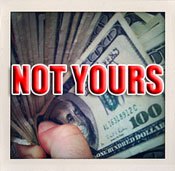That Mysterious $230,000 Deposited In Your Bank Account Is Probably Not Yours
If you checked your bank account balance to see a mysterious $230,000 deposit, what would you do? If your answer is “contact the bank and make sure the money goes back to its rightful owner,” you are correct. If you said “buy a Camaro and a new wardrobe, check into a hotel, and brag about your windfall to a police officer,” you are incorrect. Unfortunately, an Alaska fisherman chose that second option, and now he’s in jail.
The Trident seafood company wired the $230,000 into the credit union account of the owner of a boat on which the man, Timothy Andrew Boles, had been a crew member. His bank account number was one digit off that of his employer. The Alaska State Troopers say that he noticed the deposit, promptly withdrew the money, went shopping, and checked into a hotel in Soldotna. That’s where his girlfriend got drunk and made enough noise to attract the attention of the police while he was out bar-hopping.
…
[Soldotna Police Officer Tobin] Brennan ran Boles’ name, found that troopers were looking for him and got in touch with an investigator who asked him to find out if Boles had a large amount of cash, he said. Brennan asked Boles if he’d be able to pay for the hotel bill, a cab and another room.
“He’s like, ‘Oh yeah,’ ” Brennan said. “He pulls out the cash and shows me the ($90,950) check. I never had to ask him anything. … He was bragging to me about his 2010 Chevy Camaro with all the options.”
“He just kept saying it was some kind of a settlement, 20 years in the coming.”
Remember, if the money isn’t yours, don’t withdraw it. And if you do, don’t brag to the police about it. But it’s probably easier just to not take off and spend money that isn’t yours in the first place.
Fisherman’s $230,000 windfall earns a trip to jail [Anchorage Daily News] (thanks, Ryan!)
RELATED:
$10 Million Bank Error In New Zealand Leads To International Manhunt
Want more consumer news? Visit our parent organization, Consumer Reports, for the latest on scams, recalls, and other consumer issues.


